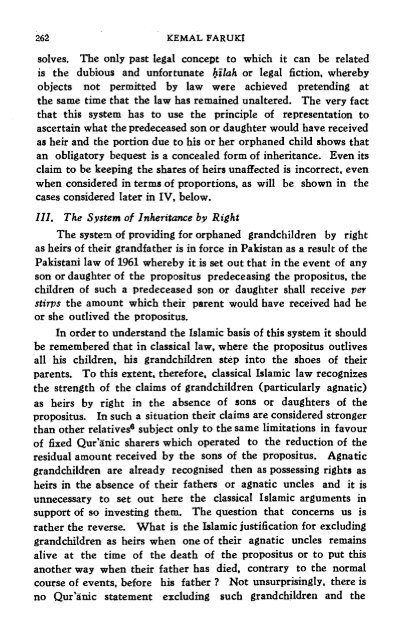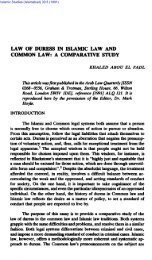ORPHANED GRANDCHILDREN IN ISLAMIC SUCCESSION LAW
ORPHANED GRANDCHILDREN IN ISLAMIC SUCCESSION LAW
ORPHANED GRANDCHILDREN IN ISLAMIC SUCCESSION LAW
You also want an ePaper? Increase the reach of your titles
YUMPU automatically turns print PDFs into web optimized ePapers that Google loves.
262 KEMAL FARUKI<br />
solves. The only past legal concept to which it can be related<br />
is the dubious and unfortunate 6T2ah or legal fiction, whereby<br />
objects not permitted by law were achieved pretending at<br />
the same time that the law has remained unaltered. The very fact<br />
that this system has to use the principle of representation to<br />
ascertain what the predeceased son or daughter would have received<br />
as heir and the portion due to his or her orphaned child shows that<br />
an obligatory bequest is a concealed form of inheritance. Even its<br />
claim to be keeping the shares of heirs unaffected is incorrect, even<br />
when considered in terms of proportions, as will be shown in the<br />
cases considered later in IV, below.<br />
III. The System of Inheritance by Right<br />
The system of providing for orphaned grandchildren by right<br />
as heirs of their grandfather is in force in Pakistan as a result of the<br />
Pakistani law of 1961 whereby it is set out that in the event of any<br />
son or daughter of the propositus predeceasing the propositus. the<br />
children of such a predeceased son or daughter shall receive per<br />
stirps the amount which their parent would have received had he<br />
or she outlived the propositus.<br />
In order to understand the Islamic basis of this system it should<br />
be remembered that in classical law, where the propositus outlives<br />
all his children, his grandchildren step into the shoes of their<br />
parents. To this extent, therefore, classical Islamic law recognizes<br />
the strength of the claims of grandchildren (particularly agnatic)<br />
as heirs by right in the absence of sons or daughters of the<br />
propositus. In such a situation their claims are considered stronger<br />
than other relatives6 subject only to the same limitations in favour<br />
of fixed Qur'anic sharers which operated to the reduction of the<br />
residual amount received by the sons of the propositus. Agnatic<br />
grandchildren are already recognised then as possessing rights as<br />
heirs in the absence of their fathers or agnatic uncles and it is<br />
unnecessary to set out here the classical Islamic arguments in<br />
support of so investing them. The question that concerns us is<br />
rather the reverse. What is the Islamic justification for excluding<br />
grandchildren as heirs when one of their agnatic uncles remains<br />
alive at the time of the death of the propositus or to put this<br />
another way when their father has died, contrary to the normal<br />
course of events, before his father ? Not unsurprisingly, there is<br />
no Qur'gnic statement excluding such grandchildren and the
















